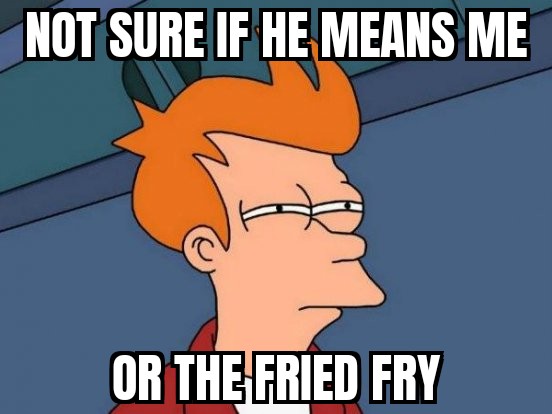Here are 3 examples:
Fried egg, fried rice, fried chicken
All these “fry” are different. If you were to use the “fry” in fried rice to fry an egg, you’d get scrambled egg. Fried chicken is done by submerging it in oil, which you won’t do with fried egg or fried rice.
This post is made from the perspective of a Cantonese/Chinese speaker. We have different words for these different types of “fry” (煎, 炒, 炸 respectively)
(Turns out I did post it in the wrong sub and I didn’t realize, and now I feel very stupid. Photon UI has once again screwed me over. Got mad for no reason.)
Sometimes after an aggressive cannabis consuming session I myself even become fried.
You forgot the small fry that will be vader someday later.
… which is a term based on the word for small fish.
Scrambled egg is still fried egg
You can make scrambled egg without any oil or butter if you have a really good non-stick pan.

Lars is so dreamy!
A true deep Fry meme
Shut up and take my upvote!
Frying is basically conveying heat to the food via oil
No, it isn’t.
Never mind the small fry. The word “put” has enough different meanings to fry your CPU.
This is why you sometimes have to make it specific by saying “deep fried” or “pan fried”.
Deep fried? Can I get deeper fried ones? How about the deepest fried ones?
Or isn’t this like the cooked stages of steak?
Non-native speaker, too.
Deep fried means submerged in oil
Deep frying is when there’s like a bowl of oil that you completely submerge the food in.
Pan frying is when it’s just a light layer of oil.
Stir fry is like pan fry, but you stir while frying.
Check out variations section of the Wikipedia article: https://en.m.wikipedia.org/wiki/Frying
A “deep fry” is distinguished by totally submerging the food in oil, as opposed to a shallow fry (less often said, but still used) where something is fried in hot oil, but not enough to totally cover it. I thiiiiink Mandarin makes a similar distinction with the use of “broad oil” versus “bottom oil”, but I don’t speak Mandarin and I’m taking that from the rough translations from Chinese cooking videos I watch.
Deep frying specificaly refers to frying by submerging in hot oil. Fried chicken is deep fried.
Fry means to cook with oil.
You have pan frying, deep frying, shallow frying, they all have additional descriptors, and you can usually infer the type from the product. You can always say deep fried chicken, but that’s also assumed when you say “fried chicken” already. If it’s fried different you would maybe say “pan fried chicken” instead.
In your opinion, what’s the difference between pan frying and sautéing?
English and French terms?
I think they can be used synonymously; sautéing may imply stirring or shaking the ingredients in the pan similarly to stir-frying.
Ah, thank you! I always found those terms confusing. I learned to cook in Spanish, so when I would describe a recipe that included “sautéing” to Anglophones, I would say that I “fried” it because that’s how it’s said in Spanish, and I guess the context helps if you are familiar with the cuisine. Anglophones would think something like deep frying, which would cause confusion or hesitation. Whereas any Latino would know that no one is deep frying sofrito.
Sautéing doesn’t use anywhere near as much fat as frying does.
To fry something (pan frying) you need at least enough fat to ensure strong contact between the entire surface of the food and the pan. Something like 1/8" (about 5mm).
Now things like pan fried chicken will take more, about half the height of the chicken pieces in the pan.
Deep frying, well, the food should submerge/float.
I thought pan fried was with a lot of oil, like pan fried chicken, and sautéed was with a small amount of oil.
Ok, so they are different??
Let’s say I want use a a small amount of olive oil to lightly fry pressed garlic, chopped onions and green bell pepper enough to make the onion translucent and release the oil from the garlic into the olive oil. The amount of olive oil used is a little more than enough to wet the mix in oil. That would be considered sautéing, not pan frying, correct?
Yes, that is sauteeing because you using a small amount of oil to keep the food from sticking and the oil kid of coats the food.
Pan fried chicken uses multiple cups of oil ao the chicken is partially submerged. If you tried to pan fry onions and green peppers the same way as pan fried chicken the oil will splash out when you put them it in due to the amount of moisture and hot oil.
Note: while I am based in the US and pan frying is probably used to mean the same thing as sauteeing somewhere else, I haven’t stumbled across that usage in a recipe before.
thank you!
You sauté to soften and pan fry to crispen would be the difference I guess. So starting from a “soft” or “hard” ingredient, but both require same amount of oil and heat. I’ve never thought of them differently, since they’re the same action.
They do not require the same amount of oil, by any measure (Metric or ACU).
Nor do they require the same heat. That’s determined by the food and end goal.
Sautéing green beans at the same temp as a fried egg will make for unevenly cooked beans.
Trying to fry an egg at green been temps will make for a nasty, oil-soaked blob where the whites are rubber and the yolk is hard, and you’ll never brown the whites.
Frying requires a moderately high heat. Sautéing can, but usually lower temps work better. With my pans, frying is about 70% heat, sautéing about 45%.
It also depends on the food.
Everything that I have seen called pan frying uses enough oil to partially submerge the food being cooked, while sautéeing is just enough oil to keep things from sticking.
Not the same amount of oil.
With sautéeing, the heat is being transferred from the pan to the food, with the thin layer of oil serving to increase the contact area and prevent sticking. It’s a low-fat cooking method.
With pan frying, it’s the hot oil that’s doing the cooking, with the pan heating the oil, not the food directly.
Edit: link
https://www.tastingtable.com/1255018/difference-sauteing-frying/
“Saute” is french for jump, or jumped. Sauteing is this action: https://media.tenor.com/EHn5Kuiw39MAAAAM/cozinhando-cooking.gif
It’s a method of frying in the sense that “stir frying” is a method of frying. Sauteing is frying in a pan, such that you’re turning the stuff over regularly by this tossing action.
One of the outcomes of sauteing is that your stuff gets browned in a randomized, pleasantly-varied manner, since with each toss-and-catch some items flip over and others end up on the same side again.
There’s also “air fry”, which is just an aggressive convection oven
Usually you need to spray or toss the stuff with a small amount of oil first, or stuff has natural oils. The term is usually for using “another oil” so I would say adding oil would be a must instead of its own oils myself.
I wouldn’t say it’s always true. If i fry a duck breast in a pan only with fat from it’s skin i would still classify it as frying even when all the fat is from the duck breast.
Usually, the food has it’s own oil, which is heated by the air around it. That’s how air-frying gets food crispy (but it doesn’t always work).
Maybe with hot oil?
I don’t think confit would be considered frying.
Slow frying would be an apt description for a confit duck breast.
English cooking vocabulary matches the sofistication of their cuisine
“To fry” means to cook in oil or fat. A distinction we can make is “deep fry” like the chicken, and “pan fry” for the other 2. We don’t use woks as much here so really the only difference between fried rice and a fried egg is whether you stir it or flip it, but both are still cooked in a pan with oil.
Deep fried and pan fried chicken are two different things even though both are cooking chicken in oil.
I think y’all are missing the point. OP points out that in their native language, Cantonese, they have different words for each of these kinds of cooking. In English, we apply modifiers, if anything; “deep fry”, “air fry”, but we don’t have different words for the different types of frying.
That’s all they’re saying. Eskimo words for snow. Oregonian words for rain. Georgian words for “you’re an idiot.” Apparently, in Cantonese, they have a lot of different words for different types of frying.
Nope, nothing ambiguous to me.
To fry means to cook in a fat. That is all.
That’s like saying “blue” is ambiguous simply because there’s also 13 different Pantone blues.
Fry is the name for baby fish.
Wait until you run into the other usages of the word!
But frying food is just using direct heat and oil to cook, regardless of the depth of the oil. And, you’d be surprised how deep the oil is when some people fry eggs or rice. It isn’t too unusual for eggs to have enough oil that they more or less float on top of it, though that isn’t done for scrambled eggs.
The word fry is also used to mean baby fish, electronics being damaged by surges or excess voltage/amperage, and sometimes even to indicate that someone is inebriated via drugs other than alcohol. Plus there’s irregular uses of the word.
And the most common use of the fish version is to describe a person or animal as a “small fry” when comparing them to another similar group.
Don’t forget vocal fry.
Even worse, trailing off vocal fryyyyy.y.y…y.y.y…
















